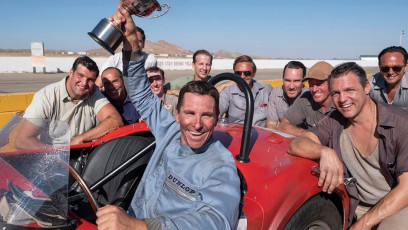5 fantastic filmmaking tips from director James Mangold - the director of Indiana Jones 5
Exclusive: The potential Indiana Jones director offers up his filmmaking tricks.


Get exclusive shortlists, celebrity interviews and the best deals on the products you care about, straight to your inbox.
You are now subscribed
Your newsletter sign-up was successful
Hugh Jackman recently said that James Mangold never being nominated for a Best Director Oscar is a travesty and we couldn't agree more. His movie roster is eclectic, seemingly skipping around genres at will. Cop Land, Girl Interrupted, Walk The Line, Logan… these are all fantastic Hollywood movies, but it’s perhaps his latest film, Le Mans ’66, that will give him his best shot at awards glory.
The movie is based on the true story of Ford taking on Ferrari in Le Mans, a 24-hour race that the Italian car manufacturer was, at the time, dominant in. Starring Christian Bale as plucky British driver Ken Miles who is chosen by automotive designer Carroll Shelby (Matt Damon) to help Ford compete in the Le Mans race.
It’s a film filled with frenetic racing scenes and edge-of-your-seat drama that could only be shot by a racing fanatic, right? Well, not quite…
“I had never been a big motor-racing guy and I felt it had come from the fact that I thought motor racing was kind of boring on television. I never really knew what was going on inside the cab, what the driver the struggling against,” explains James Mangold to ShortList.
“My goal with the movie was to somehow break through that barrier and try living on the track with the driver. I wanted to play through the first person reality of what it is to be down there.”
And it really works. Bale is mesmerising as Ken Miles, the warmest, down-to-earth character he’s ever played - and the most Brummie one, too. Some of the best scenes of the film are close-ups of him racing around the track muttering Birmingham-based colloquialisms.
“Christian had this great wadded up piece of paper that he had written all these ‘Brummie-isms’ on,” says Mangold. “And when we were driving he would literally go: ‘how about I try, ‘your face is redder than a smacked arse’. And I was like, ‘go for it!’
Get exclusive shortlists, celebrity interviews and the best deals on the products you care about, straight to your inbox.
“He would just throw them out when he was driving. It reminded me of Elvis Costello’s song wheel, he had a kind of list and he would cross off the ones he tried.”
Le Mans ’66 doesn't just focus on the drivers and the cars, though, but the power play between the suits, something that Mangold was all-too familiar with in his own job.
“It’s a giant metaphor for the movie business for me," he says about the movie. "The reality of getting a movie made is selling to suits, to studios, to financial types the viability of something that is, usually, in my case slightly offbeat. It scares them but I need to somehow get them to do it.
While this may sound draining, it's quite the opposite for Mangold who goes on to explain: “I don’t view the people in charge with contempt. Henry Ford II loved cars, but he lived his life in a bubble and all the movie executives don’t hate movies, they love movies.
"They are just trapped in a system and the system is brutal. The survival of their own families and mortgage payments depend on paying some heed to the rules of the system.
"Then, once in a while, characters as rebellious as Shelby and Miles come along and they aren’t really making their mortgages, that’s how they can be so rebellious - they are actually risking self destruction every year."
Speaking of the rules of the system, Mangold kindly gave us his 5 favourite filmmaking tips to share with you - two of which were given to him by some of cinema’s finest-ever directors.
Le Mans ’66 is in cinemas now, courtesy of 20th Century Fox. James Mangold's next movie is set to be Indiana Jones 5.
Image credits: Maximilian Bühn / 20th Century Fox

1. Always Know Your First And Last Shot Of The Scene
“You don’t need to know every shot but always know where your transition in is and your transition out is. The most unique cut in cinema is the cut between time and space, meaning the transitional cut.”

2. When Your Soundman Says The Actors Are Too Quiet, Ignore Them
“My favourite scenes were performed by actors way below, at a volume that made my soundmen go to tears.”

3. Get one more take
“Mike Nichols told me that when you think you have a good take, get one more and just ask for the actors to to do it a bit sooner and a bit quicker. I was expecting something deeper, but the truth is when shooting a movie I can’t remember the amount of times I have been in the cutting room and shouting: “Just turn your bloody head!” “SAY THE LINE”.
4. Know when you are cutting to a wide shot
“Don’t get a shot that works for anytime in the scene, get a beautiful composition for the moment of the scene that you want to go wide. Too often I feel that filmmakers have been trained to get some kind of master, where it is just ugly as it’s trying to be good for every component in the scene and you can’t make a shot good for every moment.”

5. Don’t tell me two and two is four
“This one came from Milos Forman, another teacher of mine: don’t tell me two and two is four. In other words, has your film got something new to say? As Milos would explain it: when your audience sits down to watch your film and the first fade in happens, the movie should say ‘two and two is five’. The audience should say, ‘no it isn’t’. Then the film goes on to prove the case, meaning that the reality for a movie is that its existence should have some kind of agenda that has not been done before. It’s not really about the setting or the characters but ultimately creating a question or mystery, or an anxiety or feeling that hasn’t quite been felt like this before. And if you are not, then don’t do the movie.”

As Content Director of Shortlist, Marc likes nothing more than to compile endless lists of an evening by candlelight. He started out life as a movie writer for numerous (now defunct) magazines and soon found himself online - editing a gaggle of gadget sites, including TechRadar, Digital Camera World and Tom's Guide UK. At Shortlist you'll find him mostly writing about movies and tech, so no change there then.